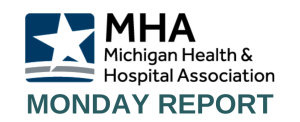
 Michigan Joins Psychology Interjurisdictional Compact
Michigan Joins Psychology Interjurisdictional Compact
Michigan officially joined the Psychology Interjurisdictional Compact March 29, creating an expedited pathway to licensure for psychologists who wish to practice telemedicine services across state lines. To date, 36 states are authorized to join …
Student Debt Relief Offered to Behavioral Health Providers
The MI Kids Now Loan Repayment Program will offer educational loan repayment for eligible behavioral health medical providers in Michigan. The program is available to behavioral health providers, including psychiatrists, psychologists, social workers, counselors, therapists, …
Governance Webinar Series Outlines Trends and Advocacy Tactics
Board members must understand the issues tied directly to hospital and health system planning and performance, identify opportunities for improvement and support the leadership in advocating for mission-driven, patient-centered policies with key stakeholders. The MHA …
Required Occupational Survey Due June 30
Completed 2022 occupational mix surveys must be submitted by hospitals to the Medicare Administrative Contractor by June 30, 2023. Hospitals are required to complete the survey every three years, with results from the 2022 survey …
 MHA CEO Report — A Healthy Michigan is an Insured Michigan
MHA CEO Report — A Healthy Michigan is an Insured Michigan
The United States celebrated last month the 13th anniversary of the signing of the Affordable Care Act. Simply put, when then-President Obama signed the legislation March 23, 2010, it was one of the most monumental healthcare policy changes in our lifetime. …
The Keckley Report
 Not for Profit Health Systems are Soft Targets: Here’s Why
Not for Profit Health Systems are Soft Targets: Here’s Why
“There are no easy answers for not-for-profit hospitals/heath systems. The issue is about more than messaging and PR. It’s about more than Medicare reimbursement (7.5% below cost), protecting programs like 340B, keeping tax exemptions and maintaining barriers against physician-owned hospitals. The issue is NOT about operating income vs. investment income: in every business, both are essential and in each, economic cycles impact gains/losses. Each of these is important but only band-aids on an open wound in U.S. healthcare.
Near-term (the next 2 years), opportunities for not-for-profit hospitals involve administrative simplification to reduce costs and improve the efficiencies and effectiveness of the workforce. Clinical documentation using ChatGPT/Bard-like tools can have a massive positive impact—that’s just a start. Advocacy, public education and Board preparedness require bigger investments of time and resources. But that’s true for every hospital, regardless of ownership. These are table stakes to stay afloat. …”
News to Know
- Registration is now open for the MHA Keystone Center Safe Patient Handling Conference.
- The MHA is issuing a request for proposal for a $50 million competitive grant program for Michigan healthcare entities to expand access to pediatric inpatient behavioral health services.
- The MHA will host an in-person Human Resources Member Forum at the MHA Headquarters in Okemos from 8:30 a.m. to noon April 26, with a virtual option available as well.
- The Root Cause Coalition is accepting requests for proposals to present at the 8th Annual National Summit on the Social Determinants of Health Dec. 3-5 in Kansas City.

 Michigan Joins Psychology Interjurisdictional Compact
Michigan Joins Psychology Interjurisdictional Compact MHA CEO Report — A Healthy Michigan is an Insured Michigan
MHA CEO Report — A Healthy Michigan is an Insured Michigan